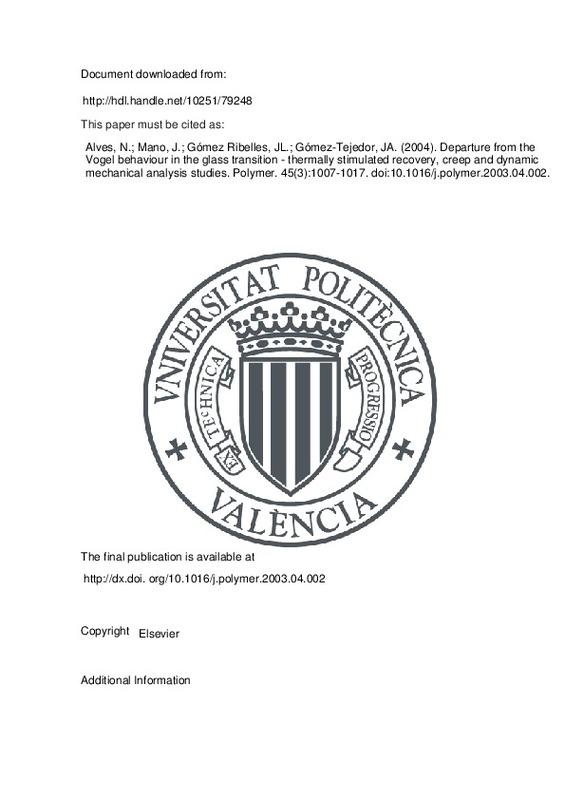JavaScript is disabled for your browser. Some features of this site may not work without it.
Buscar en RiuNet
Listar
Mi cuenta
Estadísticas
Ayuda RiuNet
Admin. UPV
Departure from the Vogel behaviour in the glass transition - thermally stimulated recovery, creep and dynamic mechanical analysis studies
Mostrar el registro sencillo del ítem
Ficheros en el ítem
| dc.contributor.author | Alves, N.M.
|
es_ES |
| dc.contributor.author | Mano, J.F.
|
es_ES |
| dc.contributor.author | Gómez Ribelles, José Luís
|
es_ES |
| dc.contributor.author | Gómez-Tejedor, José Antonio
|
es_ES |
| dc.date.accessioned | 2017-03-30T09:16:11Z | |
| dc.date.available | 2017-03-30T09:16:11Z | |
| dc.date.issued | 2004-02-01 | |
| dc.identifier.issn | 0032-3861 | |
| dc.identifier.uri | http://hdl.handle.net/10251/79248 | |
| dc.description.abstract | In this work the study of the dynamics of the segmental motions close to T, of a poly(methyl methacrylate), PMMA, network was analysed by distinct mechanical spectroscopy techniques. Three techniques were employed: dynamic mechanical analysis (DMA), creep and thermally stimulated recovery (TSR). The time-temperature superposition principle was applied to the DMA and creep results, and master curves were successfully constructed. A change from a Vogel to an Arrhenius behaviour was observed in these results. Above T, it was found a distinct temperature dependence for the retardation times calculated from creep and the relaxation times calculated from DMA. This unexpected behaviour was attributed to the merging of the a and the 0 relaxations that occurs in PMMA systems. The apparent activation energies (E-a) were also calculated from DMA, creep and TSR experiments. Above T-g the E-a values obtained agreed very well for all the techniques. In addition, the fragility exhibited by this material was investigated by the mechanical spectroscopy techniques referred above and by differential scanning calorimetry (DSC). The obtained values of the fragility index m indicated that the PMMA network is a kinetically fragile system. The thermodynamic manifestation of the fragility was also analysed. | es_ES |
| dc.language | Inglés | es_ES |
| dc.publisher | Elsevier | es_ES |
| dc.relation.ispartof | Polymer | es_ES |
| dc.rights | Reserva de todos los derechos | es_ES |
| dc.subject | poly(methyl methacrylate) | es_ES |
| dc.subject | mechanical behaviour | es_ES |
| dc.subject | fragility | es_ES |
| dc.subject.classification | MAQUINAS Y MOTORES TERMICOS | es_ES |
| dc.subject.classification | FISICA APLICADA | es_ES |
| dc.title | Departure from the Vogel behaviour in the glass transition - thermally stimulated recovery, creep and dynamic mechanical analysis studies | es_ES |
| dc.type | Artículo | es_ES |
| dc.identifier.doi | 10.1016/j.polymer.2003.04.002 | |
| dc.rights.accessRights | Abierto | es_ES |
| dc.contributor.affiliation | Universitat Politècnica de València. Escuela Técnica Superior de Ingenieros Industriales - Escola Tècnica Superior d'Enginyers Industrials | es_ES |
| dc.contributor.affiliation | Universitat Politècnica de València. Escuela Técnica Superior de Ingeniería del Diseño - Escola Tècnica Superior d'Enginyeria del Disseny | es_ES |
| dc.description.bibliographicCitation | Alves, N.; Mano, J.; Gómez Ribelles, JL.; Gómez-Tejedor, JA. (2004). Departure from the Vogel behaviour in the glass transition - thermally stimulated recovery, creep and dynamic mechanical analysis studies. Polymer. 45(3):1007-1017. doi:10.1016/j.polymer.2003.04.002 | es_ES |
| dc.description.accrualMethod | S | es_ES |
| dc.relation.publisherversion | http://dx.doi.org/10.1016/j.polymer.2003.04.002 | es_ES |
| dc.description.upvformatpinicio | 1007 | es_ES |
| dc.description.upvformatpfin | 1017 | es_ES |
| dc.type.version | info:eu-repo/semantics/publishedVersion | es_ES |
| dc.description.volume | 45 | es_ES |
| dc.description.issue | 3 | es_ES |
| dc.relation.senia | 25487 | es_ES |
| dc.identifier.eissn | 1873-2291 |







![[Cerrado]](/themes/UPV/images/candado.png)

